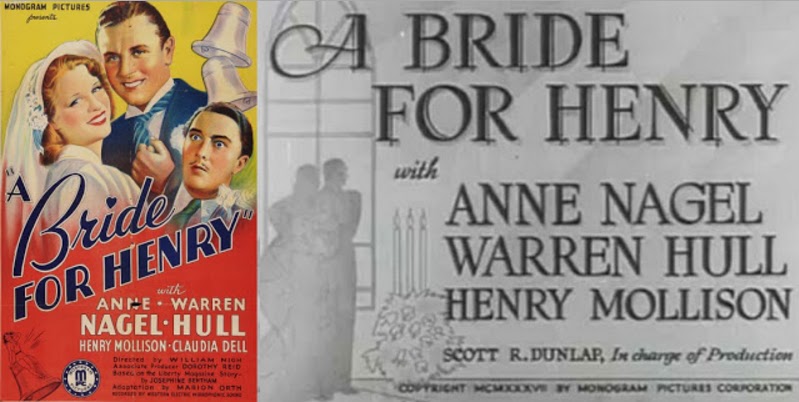 |
| Try to guess, based solely on the poster, which guy winds up with the girl in A Bride for Henry. |
The flick: A Bride for Henry (Monogram Pictures, 1937) [buy the set]
Current IMDb rating: 5.9
Director: William Nigh (The Ape; several Mr. Wong films with Boris Karloff)
Actors of note:
- Anne Nagel (starred in many serials for Universal in the 1940s; appeared in a couple of W.C. Fields movies, Never Give a Sucker an Even Break and My Little Chickadee; died at age 53 of alcoholism)
- Warren Hull (a second-stringer at Warner Brothers and a star at "poverty row" studios; appeared in Michael Curtiz's The Walking Dead with Karloff)
- Henry Mollison (The Man in the White Suit), Claudia Dell (Cecil B. DeMille's 1934 version of Cleopatra)
- Betty Ross Clarke (Murder in the Rue Morgue)
- I. Stanford Jolley (The Violent Years)
- Carleton Young (instantly recognizable as the gangster Jack from Reefer Madness, but his resume is incredible.)
 |
| The prize: Anne Nagel |
Once the newlyweds get to their hotel, Eric himself finally arrives and begins to spend a lot of quality time with Sheila. Henry decides that "two can play at that game" and starts canoodling with glamorous blonde Helen Van Orden (Dell) and impressing all the young lovelies at the hotel with his diving skills. It soon becomes clear that Henry and Sheila are in love and are just using Eric and Helen to make each other jealous. Eric won't give up so easily, though, and he and Henry compete for Sheila's affections, finally resorting to fisticuffs in the film's climax.
 |
| Henry Mollison, a loser in love. |
I'm guessing that dozens of films in the same general vein as A Bride for Henry must be lurking out there. It's yet another light, bubbly, inconsequential romantic comedy with a silly, contrived gimmick, in this case the fact that the heroine has married the hero simply to get back at her fiance. It's easy to tell in these films which man and woman are going to end up together at the end just by looking at the credits. The top-billed man is destined to win the top-billed woman. In this film, Henry Mollison is third-billed behind Anne Nagel and Warren Hull. Therefore, he's doomed. Worse yet, he's a sophisticated, genteel Brit rather than a strutting, macho all-American type like Hull.
The trouble here is that Henry Mollison's character, Eric, is pretty much the only person in this movie I actually liked, even though he's supposed to be the heel. I ended up genuinely sympathizing with him when his efforts to win Sheila back are plagued by disasters. In one of the movie's funnier scenes, for instance, he and Sheila are forced to temporarily borrow a pair of bicycles without permission; later, they are confronted by the bicycles' rightful owners, two children -- one of whom bites Eric's hand while the other one kicks him in the behind. Ever the gentleman, Eric's reaction is understated: "Charming children."
Anne Nagel is not a bad comic actress and possesses incredibly beautiful eyes, but her character in this film is a nightmare with her temper tantrums and whiplash-inducing changes of mood. It doesn't help that all three main characters seem to be wealthy and famous to some degree because it makes their story seem all the more trivial. The script never comes out and says what's so special about these people, but fedora-wearing reporters with gigantic cameras follow them everywhere, and their love triangle is front page news. I guess that makes them 1930s equivalents of today's tabloid celebrities, but who really gives a damn about the problems of such people?
Is it funny: Not nearly as funny as it should have been. The cast is more than adequate, and the premise is workable (if not incredibly creative), but there seems to be very little zip or energy to this production. Everyone just kind of goes through the motions. The closest I came to really enjoying A Bride for Henry was during the scenes in which stuffy, oh-so-proper Eric suffers indignity after indignity. At one point, his bicycle topples over and he is wedged underneath it. Sheila, trying to help, tugs on his foot as if she's attempting to pull Eric's entire body through the middle of the bike frame. "Darling," he says with perfect British reserve, "you're not accomplishing a thing." I would have restructured the entire movie around Eric and put him through a gauntlet of humiliating ordeals as he tries to win Sheila back. That might have made for a very funny movie indeed.
My grade: B-
P.S. - Not a stereotype for miles, folks!
